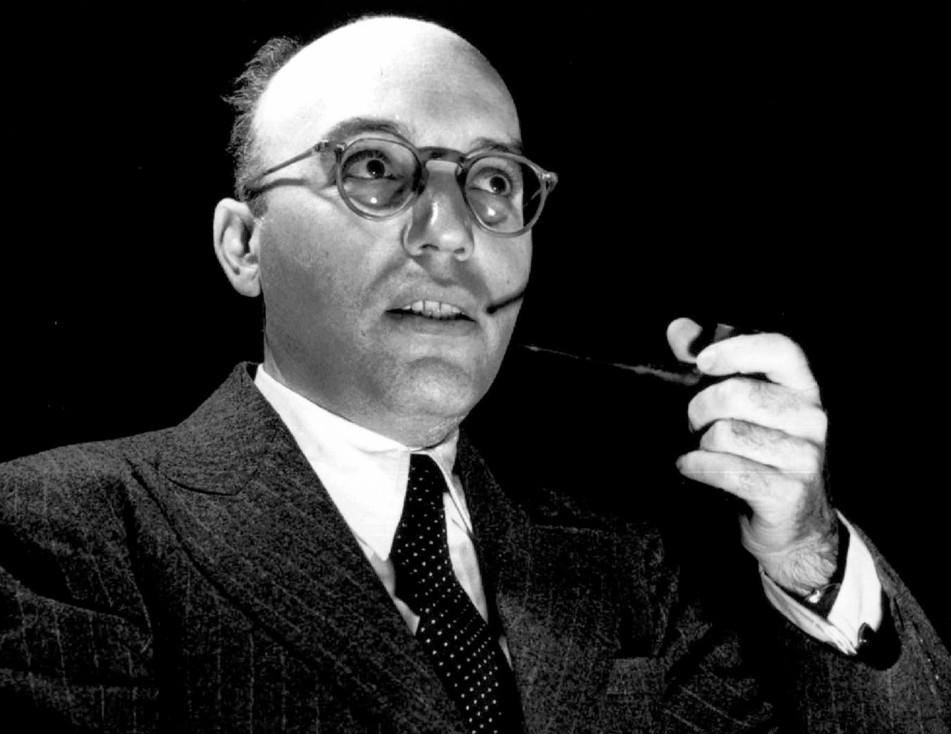It’s safe to say that all serious lovers of music have heard music written by Kurt Weill, yet aren’t aware of who he is and the remarkable story of his life.

The first thing we need to do is associate him with a time and place. If the 1920’s were Babe Ruth’s America, then the 1920’s were Kurt Weill’s Germany. If the musical and film, Cabaret, had decided to use music from the era rather than Kander and Ebb’s, Sally and the Master of Ceremonies would’ve been singing Kurt’s music and nothing else. In short, he wrote the soundtrack to the Weimar Republic.
While we know him for musical theater, he began his career with the intention of being a composer of symphonies and chamber music. A wonderful early work that I’ve always wanted to conduct is his Concerto for Violin and Wind Orchestra from 1925.
However, he realized early on that he had a gift for writing songs and this gift led him to the musical stage. His partner during the heady times of 1920’s Berlin, was the lyricist and poet, Bertolt Brecht, and their most enduring and most famous work is, The Threepenny Opera, a re-telling of John Gay’s The Beggar’s Opera from the 18th century.
The song, Mack the Knife, is still in the American consciousness from Bobby Darin’s 1959 version, which quickly topped the charts. The way he portrays Mack the Knife in his version makes it sound like he’s a dangerous, but fun guy to hang out with, rather than a psychopathic murderer.
Yet, when we hear none other than Bertolt Brecht sing it, even if your German isn’t so great, you know he’s not singing about anything other than pure evil. Don’t worry, I’ve provided a rudimentary translation below.
And the shark has teeth Und der Haifisch, der hat Zähne
And he’s wearing it on his face Und die trägt er im Gesicht
And Macheath has a knife Und Macheath, der hat ein Messer
But you don’t see the knife. Doch das Messer sieht man nicht.
On a nice blue Sunday An ‘nem schönen blauen Sonntag
A dead man is lying on the beach Liegt ein toter Mann am Strand
And a person goes around the corner Und ein Mensch geht um die Ecke
Which is called Mackie Messer. Den man Mackie Messer nennt.
And Schmul Meier has disappeared Und Schmul Meier bleibt verschwunden
And some rich men Und so mancher reiche Mann
And Mackie Messer has his money Und sein Geld hat Mackie Messer
To whom you can prove nothing. Dem man nichts beweisen kann.
Jenny Towler was found Jenny Towler ward gefunden
With a knife in my chest Mit ‘nem Messer in der Brust
And Mackie Messer goes on the quay Und am Kai geht Mackie Messer
Who knew nothing of everything. Der von allem nichts gewußt.
And the big fire in Soho Und das große Feuer in Soho
Seven children and an old man – Sieben Kinder und ein Greis –
In the crowd Mackie Messer In der Menge Mackie Messer, den
You don’t ask and you don’t know anything. Man nicht fragt und der nichts weiss.
And the minor widow Und die minderjährige Witwe
Everyone knows their names Deren Namen jeder weiss
Woke up and was desecrated – Wachte auf und war geschändet –
Mackie, what was your price? Mackie, welches war dein Preis?
Woke up and was desecrated – Wachte auf und war geschändet –
Mackie, what was your price? Mackie, welches war dein Preis?
Weill, like so many, had to flee Germany in 1933. At this time, he was the most prominent Jewish composer and was an easy target. He first went to Switzerland, then Paris, where he teamed up with Brecht for the last time to write another one of his most endearing works, The Seven Deadly Sins. While it is so often done with only a soprano, a male quartet of singers, and orchestra, it was commissioned for soprano and dancer, with original choreography by George Balanchine, who was to portray the split personality that is inherent in Anna. This Paris Opera production is a lot more involved than the original, but you get the idea that Anna is much more than what is sung.
My favorite recording is not, surprisingly, by Lotte Lenya, but by Gisela May. She has the sound of one more pack of unfiltered cigarettes in her voice.
In 1934, he wrote his last purely orchestral work, his absolutely fantastic Symphony №2. It was premiered by Bruno Walter, first with Concertgebouw Orchestra and then with the New York Philharmonic. It is in three movements and, in my opinion, one of the most important pre-war German symphonies.
If his story had ended here, Weill’s contribution to musical theater and the arts would be greatly admired and esteemed, but it’s his immigrant story to the U.S. that has forever changed our musical landscape. Weill and his wife, Lotte Lenya, moved to New York City in 1935. He quickly and wholeheartedly adapted to his new surroundings, quickly learned English, and began writing for Broadway. His first “hit,” however, was the biblical drama, The Eternal Road, with words by Franz Werfel (one of the many amores of Anna Mahler).
Like Copland, Weill had a populist streak and wanted his music to speak directly to the people. But, he felt that the musical could be so much more than what was typically written on Tin Pan Alley. He had a string of successes that included, Lady in the Dark, and, One Touch of Venus, and his 1946 musical, Street Scene, with lyrics by Langston Hughes, is considered to be his American classic.
In listening to just the very beginning of Street Scene, you realize that Bernstein’s West Side Story simply could not have happened without Kurt Weill, for he paved the way for dramatic stories to be told on the Great White Way.
For further reading, I encourage you to read Joseph Horowitz’s Artists in Exile.
